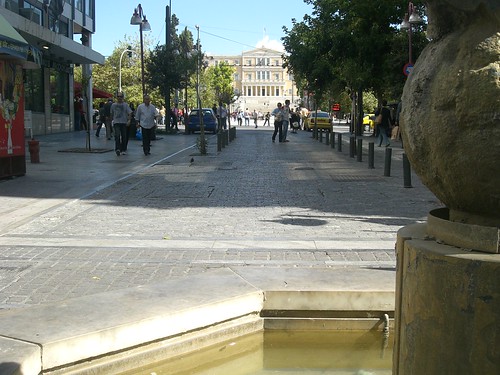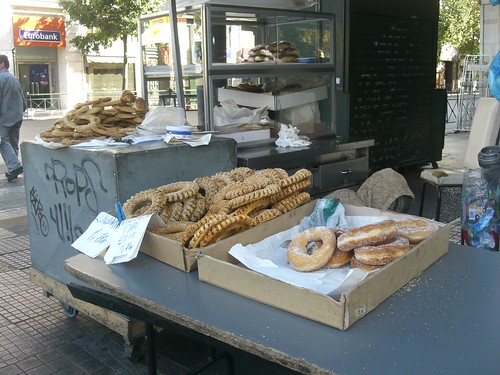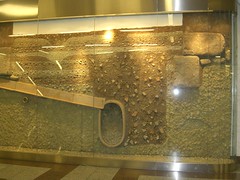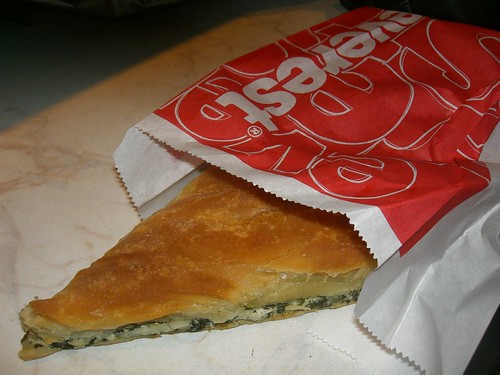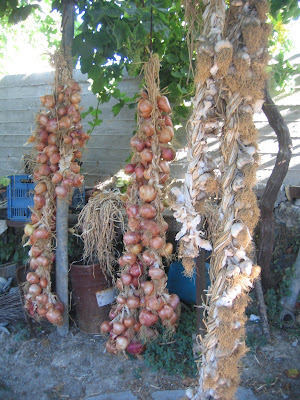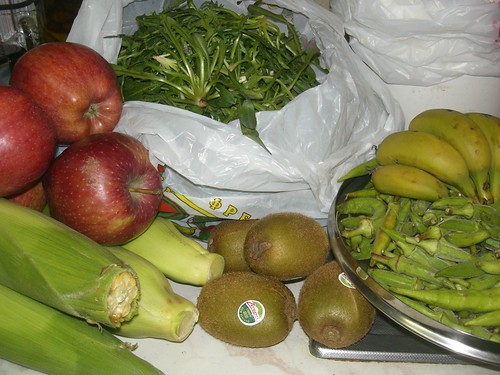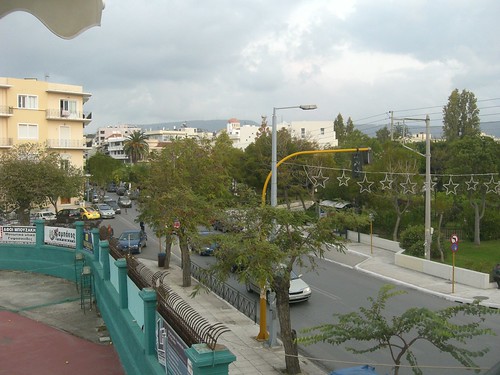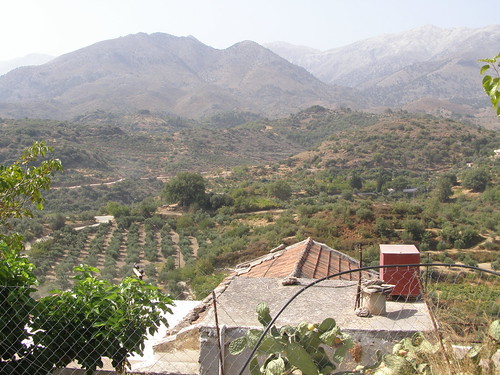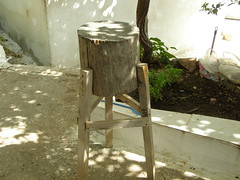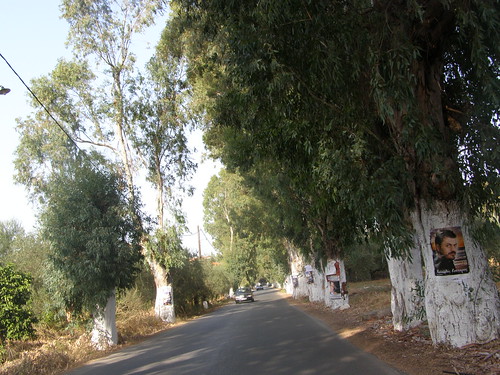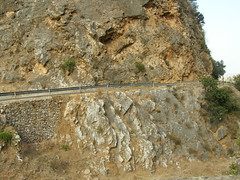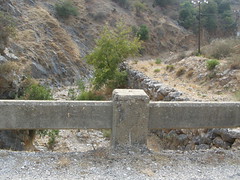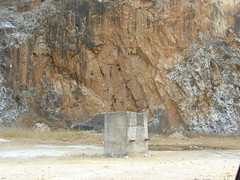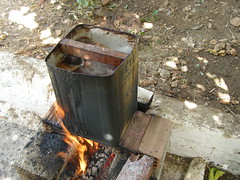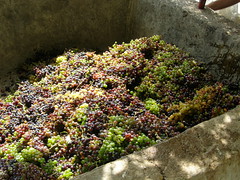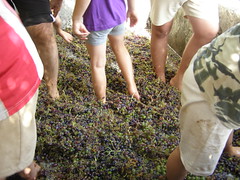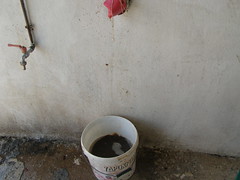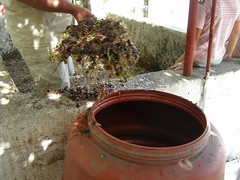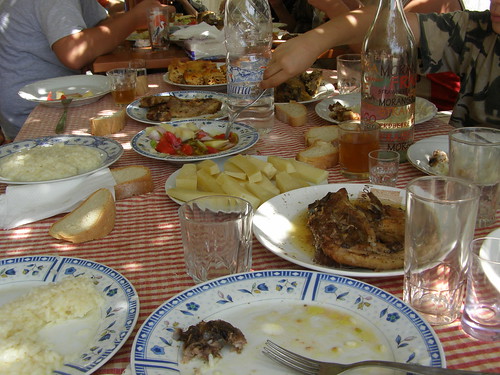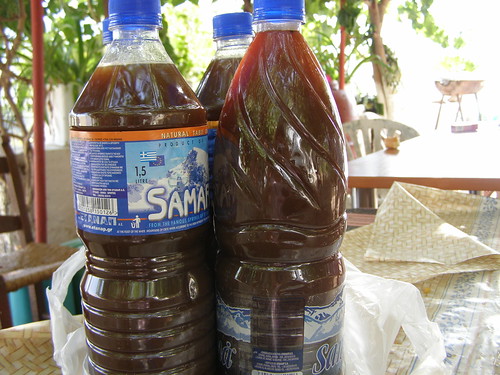An anchor and a propeller, displayed outside the Naval Museum of Hania, at the Old Port.
The old minaret adjacent to St Nikolaos church is a perfect reminder of the way the East met the West in the town I made my home, Chania, Crete, Greece. The photographs I post all help to tell a part of a longer story that focuses on the town and its citizens, whether they are living there now, or have made their home in other parts of the world. As a newer resident, by writing about the town in this way, I am trying to put some order into the chaos that I seem to be confronted with.
Friday 31 October 2008
Thursday 30 October 2008
Entrance to the old town
Wednesday 29 October 2008
Old well
Tuesday 28 October 2008
NO Day
68 years ago, Greece said 'OXI' (NO) to fascism, on the 28th of October, 1940. Since then, Greece has celebrated two independence days, both of which are public holidays (the other is on 25th March). 28 October is officially known as NO Day in Greece: lest we forget.
On the eve of the commemoration, school children recite poems and perform sketches, re-enacting the events of those times; this event is attended by any parent (who isn't working, presumably, as the event is always staged in the morning). As you can see, I kind of missed it...
On the eve of the commemoration, school children recite poems and perform sketches, re-enacting the events of those times; this event is attended by any parent (who isn't working, presumably, as the event is always staged in the morning). As you can see, I kind of missed it...
Monday 27 October 2008
Post-weekend story: Double identity
Recently, I had the odd task of having to prepare my children's school meals 160 nautical miles away from home. Really weird, but that was the agreement between me and my husband if I wanted to go to the big smoke and meet up with a friend. The food had to be able to remain relatively fresh; all I'd have to do when I came back home would be to put it into my children's schoolbags within the same hour that I arrived. What kind of healthy prepared street-cafe food can you buy for your children's Monday lunchboxes on a Sunday, when you're flying back home 160 nautical miles away at 5.30 the next morning?
I had arranged to meet up with my friend in the middle of Athens. Σύνταγμα - Sintagma (Constitution Square) - was teeming with people that day, even though it was a Sunday and all the commercial shops on Ermou St were closed. The day was sunny, warm and breezy, a perfect day for a Sunday βόλτα (volta - stroll), which most of the town's residents were doing. There were pigeons flying all over place on the pavement, people were taking photos of Parliament's guards in their sentry boxes, the McDonalds on the corner was full of youthful faces enjoying their happy meals and a whole range of foreign languages could be heard all over the place, interrupted occasionally by the Greek language. I had some time to spare before the appointed meeting to search for what I could buy from around the area that could travel safely, not go off or become stale, stay intact without getting mushy in my backpack, and more importantly, resemble a nutritiously rich meal that could constitute a child's school meal.
The side streets of Sintagma Square leading to the Acropolis abound with mini-markets, cafes and παντοπολεία - pantopolia - literally a 'sell-everything' shop. In terms of edibles, the one I chanced on sold croissants, potato chips, sweets, sodas, fragile φρυγανιές (crumbly rusks that look like miniature toasts) as well as tinned goods. About the only healthy item in it was fruit, which was out of the question: bananas will go black with the merest touch, while the other all-time classic morning-break fruit, the apple, bruises easily, and may need peeling if you don't know what its pesticide content is.
I was beginning to feel I had lost the battle for a healthy mid-morning school snack when I spotted a lady selling the classic Greek bagel - κουλούρι, koulouri - at a stand on the corner of the road on Μητροπόλεως (mitropoleos - Cathedral) and Φιλελλήνων (filelinon - Philhellenic) Streets. Bagels are quite durable; in any case, they don't lose their taste, nor do they become stale in 24 hours. A perfect choice; I bought two plain soft bagels, two hand-shaped hard ones and a tomato-and-feta filled soft bagel, ditching plans to buy the full range, which also included chocolate-filled ones. Koulouria are usually eaten on their own, but if you manage to avoid the temptation of munching into them on the street, they go great with a piece of cheese, a few olives and a glass of wine, which I didn't have handy on me at the time, the reason why I didn't deal with my own bagel choice (the filled one, naturally) till I got back to Hania.
Monday's school lunch wasn't tricky at all. The cafes in the area served luscious looking sandwiches and πίτες (pites - pies) of all types: cheese, sausage, sweet cream, spinach, hotdog, mince, you name it. My only caveat was that they would be subjected to all sorts of bruising, temperatures and humidity levels in my bag, so I decided not to buy anything from the road, except for my own lunch (before I was treated to a sumptuous dinner by my friend. I could easily buy my children something similar for their lunch from the airport cafeterias, which served this kind of food.
I had almost forgotten to have lunch that day (such a rare occurrence in my life), I was so excited, not just about meeting my friend, but because I had managed to achieve so much in one day. I had seen a few relatives in Aspropirgos (a dingy Western suburb in the Greater Athens area), walked through the neighbourhood I had lived in for two years before settling in Hania permanently (Egaleo, another neighbourhood of Western Athens), and enjoyed the luxury of the organised Athenian mass transportation system, via the suburban blue buses and the Athenian underground.
It is a fact that Athens has not improved its dreary image since I was last living there, but that is simply not true about the means of transport: the underground in Athens is clean, modern, awesome, even beautiful. Walking into the underground world of Athens is like entering a museum full of ancient antiquities: in some parts of it, when the lighting is set in such a way that it highlights a particular monument on display in the foyers, you might even get the feeling that Hades is lurking somewhere in the twilight, ready to turn you into a pillar of salt if you dare to turn around and look, like he did to Eurydice when Orpheus wanted to check that Hades had kept his word about his lover's return. Most of the treasures found in the foundations of the underground during its construction were eventually turned into a museum display piece.

(Some of the Parthenon marbles Elgin stole; these ones are the fakes, on display at the Acropolis metro station)
A long time had passed since I last went to see the Acropolis. Of course, the whole area has changed since I was last there, but my instinct led me in the right direction during my short interlude in the area. I got out of the metro at the Acropolis stop, located right next to the brand new Acropolis Museum, a strategic environmentally-friendly station, enabling people to have more efficient access to an important landmark, without the need to bring their own car to an already over-congested area (top marks to the town planners). The hot autumn sun made up my mind for me: the Acropolis also looks good at lower ground level, and I don't need to work up a sweat by walking up the hill to get to see it close up. (Believe me, I've been much closer to it than anyone can get to it in modern times.) It was at this point that I remembered I was feeling hungry and thirsty. Right across the Acropolis metro station were a few strategically positioned cafes and snack bars. Everest was located on a highly visible corner near a row of crafts and souvenir shops.
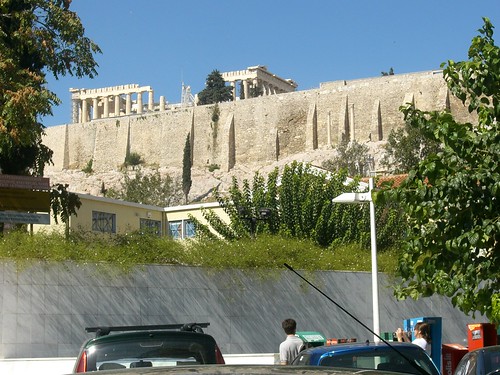
(above - the Acropolis of Athens; below - the foundations of the Acropolis museum among excavated ruins; a view of the apartment blocks facing the Acropolis - dingy as they look, they enjoy one of the most amazing views in the world )
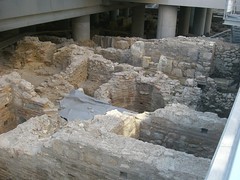
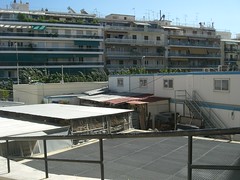
Everest is a chain store selling snack food and refreshments right throughout the country. Its food is prepared in the way most chain stores run; it is very centralised. At one of a few places in some industrial areas of the country (like Aspropirgos in Athens, where I overnighted with relatives before my Sunday adventure in the centre of Athens), people are busy preparing food in different ways for different businesses, most likely using processed ingredients: a fast-food chain may sell profiterole desserts in octagonal plastic tubs (like Everest), while another fast food chain might want chocolate mousse served in smooth round plastic bowls (like Goody's). Another chain may order spinach pie made with thick pastry (like Everest), while another chain may prefer to serve a spiral spinach pie made with thin filo pastry (like Greogry's). The food is prepared according to each customer's specifications, after which it is stored appropriately, and trucked or shipped to the branches of these fast food outlets, be they close to the production plant or a remote island.
The advertising of each company may claim that their food is 'fresh', but this is all relative. A product that is stored under artificially controlled conditions to keep its appearance, shape and smell 'fresh' cannot be compared to the same product that was made and eaten on the same day in someone's kitchen, which will not be subjected to any kind of unnatural treatment in order to prevent it from spoilage. My Everest spanakopita cost me 1.95 euro and it was very satisfying; having said that, I must admit that I am a spanakopita fanatic, and it is usually the only thing I buy from a snack food outlet when I need to have a meal on the run. I ignore the ringing bells in my head sounding out warnings against fast food; we do this irregularly, and only when we need to. I even went into a McDonalds while I was at Sintagma; the coffee was OK, the toilets excellent.
Spanakopita was the kind of thing I had in mind for my children's school lunch. I decided to buy them each a piece of Everest spanakopita at the airport, another place where you can find 24/7 fast food chains en masse, each one claiming to serve you the healthiest food made with the freshest ingredients possible, served warm after a short zap in a microwave oven.
When I arrived at Athens airport, I checked out each food outlet and wondered what kind of money people make in Athens in order to be able to afford to eat here: hot drinks cost well over 2 euro a cup, while sandwiches and pastry-encased cheese, spinach, sausage, chocolate or cream cost at least 3 euro a piece. A family of four with a long delay between flights would need to spend at least 20 euro to eat here. In Hania, we spend about 40 euro for a modest but well-cooked fresh taverna family meal. I was in shock, and it was not just the cost of living that knocked me out: Everest was selling exactly the same spanakopita that I ate in central Athens for 3 euro and 30 cents at the airport; that's 1 euro and 35 cents more than in the other branch.
I was in two minds about what to do. In any case, there is an Everest outlet at Hania airport (which I was hoping would be open), so I decided to buy my children's meals when I arrived in Hania instead. That way they would also be 'fresher'. I hopped off the aeroplane at 6.30am and walked through to the arrivals foyer. Everest was open there too: same spanakopita, same price as at Athens airport. It was too early in the morning to argue, but I've kept the receipts: one price at one outlet, a different one at another. Where I was born, we would call this a bloody rip-off. I bought two pieces of Everest spanakopita (individually wrapped, thank you), and took a cab, which, coincidentally, cost me twice as much as what it cost me in Athens to be driven the same number of kilometres. Where is the country heading to? I ask myself.
©All Rights Reserved/Organically cooked. No part of this blog may be reproduced and/or copied by any means without prior consent from Maria Verivaki.
I had arranged to meet up with my friend in the middle of Athens. Σύνταγμα - Sintagma (Constitution Square) - was teeming with people that day, even though it was a Sunday and all the commercial shops on Ermou St were closed. The day was sunny, warm and breezy, a perfect day for a Sunday βόλτα (volta - stroll), which most of the town's residents were doing. There were pigeons flying all over place on the pavement, people were taking photos of Parliament's guards in their sentry boxes, the McDonalds on the corner was full of youthful faces enjoying their happy meals and a whole range of foreign languages could be heard all over the place, interrupted occasionally by the Greek language. I had some time to spare before the appointed meeting to search for what I could buy from around the area that could travel safely, not go off or become stale, stay intact without getting mushy in my backpack, and more importantly, resemble a nutritiously rich meal that could constitute a child's school meal.
The side streets of Sintagma Square leading to the Acropolis abound with mini-markets, cafes and παντοπολεία - pantopolia - literally a 'sell-everything' shop. In terms of edibles, the one I chanced on sold croissants, potato chips, sweets, sodas, fragile φρυγανιές (crumbly rusks that look like miniature toasts) as well as tinned goods. About the only healthy item in it was fruit, which was out of the question: bananas will go black with the merest touch, while the other all-time classic morning-break fruit, the apple, bruises easily, and may need peeling if you don't know what its pesticide content is.
I was beginning to feel I had lost the battle for a healthy mid-morning school snack when I spotted a lady selling the classic Greek bagel - κουλούρι, koulouri - at a stand on the corner of the road on Μητροπόλεως (mitropoleos - Cathedral) and Φιλελλήνων (filelinon - Philhellenic) Streets. Bagels are quite durable; in any case, they don't lose their taste, nor do they become stale in 24 hours. A perfect choice; I bought two plain soft bagels, two hand-shaped hard ones and a tomato-and-feta filled soft bagel, ditching plans to buy the full range, which also included chocolate-filled ones. Koulouria are usually eaten on their own, but if you manage to avoid the temptation of munching into them on the street, they go great with a piece of cheese, a few olives and a glass of wine, which I didn't have handy on me at the time, the reason why I didn't deal with my own bagel choice (the filled one, naturally) till I got back to Hania.
Monday's school lunch wasn't tricky at all. The cafes in the area served luscious looking sandwiches and πίτες (pites - pies) of all types: cheese, sausage, sweet cream, spinach, hotdog, mince, you name it. My only caveat was that they would be subjected to all sorts of bruising, temperatures and humidity levels in my bag, so I decided not to buy anything from the road, except for my own lunch (before I was treated to a sumptuous dinner by my friend. I could easily buy my children something similar for their lunch from the airport cafeterias, which served this kind of food.
I had almost forgotten to have lunch that day (such a rare occurrence in my life), I was so excited, not just about meeting my friend, but because I had managed to achieve so much in one day. I had seen a few relatives in Aspropirgos (a dingy Western suburb in the Greater Athens area), walked through the neighbourhood I had lived in for two years before settling in Hania permanently (Egaleo, another neighbourhood of Western Athens), and enjoyed the luxury of the organised Athenian mass transportation system, via the suburban blue buses and the Athenian underground.
It is a fact that Athens has not improved its dreary image since I was last living there, but that is simply not true about the means of transport: the underground in Athens is clean, modern, awesome, even beautiful. Walking into the underground world of Athens is like entering a museum full of ancient antiquities: in some parts of it, when the lighting is set in such a way that it highlights a particular monument on display in the foyers, you might even get the feeling that Hades is lurking somewhere in the twilight, ready to turn you into a pillar of salt if you dare to turn around and look, like he did to Eurydice when Orpheus wanted to check that Hades had kept his word about his lover's return. Most of the treasures found in the foundations of the underground during its construction were eventually turned into a museum display piece.

(Some of the Parthenon marbles Elgin stole; these ones are the fakes, on display at the Acropolis metro station)
A long time had passed since I last went to see the Acropolis. Of course, the whole area has changed since I was last there, but my instinct led me in the right direction during my short interlude in the area. I got out of the metro at the Acropolis stop, located right next to the brand new Acropolis Museum, a strategic environmentally-friendly station, enabling people to have more efficient access to an important landmark, without the need to bring their own car to an already over-congested area (top marks to the town planners). The hot autumn sun made up my mind for me: the Acropolis also looks good at lower ground level, and I don't need to work up a sweat by walking up the hill to get to see it close up. (Believe me, I've been much closer to it than anyone can get to it in modern times.) It was at this point that I remembered I was feeling hungry and thirsty. Right across the Acropolis metro station were a few strategically positioned cafes and snack bars. Everest was located on a highly visible corner near a row of crafts and souvenir shops.

(above - the Acropolis of Athens; below - the foundations of the Acropolis museum among excavated ruins; a view of the apartment blocks facing the Acropolis - dingy as they look, they enjoy one of the most amazing views in the world )


The advertising of each company may claim that their food is 'fresh', but this is all relative. A product that is stored under artificially controlled conditions to keep its appearance, shape and smell 'fresh' cannot be compared to the same product that was made and eaten on the same day in someone's kitchen, which will not be subjected to any kind of unnatural treatment in order to prevent it from spoilage. My Everest spanakopita cost me 1.95 euro and it was very satisfying; having said that, I must admit that I am a spanakopita fanatic, and it is usually the only thing I buy from a snack food outlet when I need to have a meal on the run. I ignore the ringing bells in my head sounding out warnings against fast food; we do this irregularly, and only when we need to. I even went into a McDonalds while I was at Sintagma; the coffee was OK, the toilets excellent.
Spanakopita was the kind of thing I had in mind for my children's school lunch. I decided to buy them each a piece of Everest spanakopita at the airport, another place where you can find 24/7 fast food chains en masse, each one claiming to serve you the healthiest food made with the freshest ingredients possible, served warm after a short zap in a microwave oven.
When I arrived at Athens airport, I checked out each food outlet and wondered what kind of money people make in Athens in order to be able to afford to eat here: hot drinks cost well over 2 euro a cup, while sandwiches and pastry-encased cheese, spinach, sausage, chocolate or cream cost at least 3 euro a piece. A family of four with a long delay between flights would need to spend at least 20 euro to eat here. In Hania, we spend about 40 euro for a modest but well-cooked fresh taverna family meal. I was in shock, and it was not just the cost of living that knocked me out: Everest was selling exactly the same spanakopita that I ate in central Athens for 3 euro and 30 cents at the airport; that's 1 euro and 35 cents more than in the other branch.
I was in two minds about what to do. In any case, there is an Everest outlet at Hania airport (which I was hoping would be open), so I decided to buy my children's meals when I arrived in Hania instead. That way they would also be 'fresher'. I hopped off the aeroplane at 6.30am and walked through to the arrivals foyer. Everest was open there too: same spanakopita, same price as at Athens airport. It was too early in the morning to argue, but I've kept the receipts: one price at one outlet, a different one at another. Where I was born, we would call this a bloody rip-off. I bought two pieces of Everest spanakopita (individually wrapped, thank you), and took a cab, which, coincidentally, cost me twice as much as what it cost me in Athens to be driven the same number of kilometres. Where is the country heading to? I ask myself.
©All Rights Reserved/Organically cooked. No part of this blog may be reproduced and/or copied by any means without prior consent from Maria Verivaki.
Sunday 26 October 2008
Saturday 25 October 2008
Friday 24 October 2008
Sky watch Friday: Pine tree
A beautiful autumn day; the sunny sky as seen through a pine tree outside the children's public library in the municipal gardens near the clock.
Thursday 23 October 2008
Closed for the winter
Stivanadika, a tourist shop avenue, looking quite empty.
The souvenir shops are locked,
the tourist season is over,
the lease on the town has expired.
The citizens of Hania
have got their town back
for their own use.
That's not where they go
to buy their leather sandals, T-shirts,
olive oil soap and herbs and spices.
They want the shops
made with glass and concrete -
the chic boutiques,
the big bright supermarkets
with their sliding doors
selling all kinds of plasticulture.
Good bye stivanadika,
have a good rest
till the next summer.
Wednesday 22 October 2008
Tuesday 21 October 2008
Old man at St Luke's
Agios Loukas (St Luke) church houses the town's inner city cemetery. It is located on a street that approaches the town from the west. But that's not why I took the photo. I wanted to talk to you about the old man walking on the pavement. He leaves his house somewhere further down the road, and taps his way up the corner of the road just a few more steps ahead of him. Then he turns back down the same road he came up on, and walks back home. He does this two times a day, every day.
Whenever I walk along this road, I feel very happy to see him. He uses familiar landmarks that he has mapped out in his mind, like the lamp posts, electricity poles, the texture of the walls and gates that he passes, among other things. I got to know him a long time ago when I noticed he was tapping his stick on a car that had been parked on the footpath.
"Do you need any help?" I asked him.
"Oh, no, thanks, I'm fine," he answered. "It's just this car that's been parked here for a long time, and it's blocking my access to the rest of the road."
"Would you like me to help you maneuver your way round it?" I asked helpfully.
"No, thanks, no, I don't walk anywhere else except this stretch of road if it's clear of cars. I'm completely blind," he told me.
I'm still seeing him take his daily walk here, and I think that's a good sign. It means he hasn't moved home to St Luke's yet.
Monday 20 October 2008
Post-weekend story: Economic crisis?
Last Wednesday was the day the powers that be designated as World Poverty Day. The images usually associated with poverty are hungry black children living in slums. With the recent economic crisis, poverty might take on a new meaning. Poverty in developing countries does not compare to poverty in developed countries. Let's not forget that poverty in developed countries partly has to do with how much debt an individual has accrued on a credit card (needs are satisfied without being paid for), while in developing countries, poverty has to do with not being able to acquire basic needs in the first place.
In developed countries, people don't have to spend a lot of money on food. They can fill their stomachs with hi-fat, hi-carb, low-nutrient-value food at a fraction of the cost people in developing countries pay for their food. Those same poor people are also the fattest people in the country. In terms of food shopping, poor people will buy cheap food. It is a sorry state of affairs that the cheapest food is also the least nutritious, and this trend is unlikely to cease. What do people do food-wise to economise? Eat cheap takeaways, for one, and buy ready food from discount supermarkets. I'm not an economist, so please forgive me if I get my facts wrong in this, but I don't think I'm deluded when I say that I believe the average Cretan family won't be doing this. Somewhere, some place, something is growing freely, cultivated by someone who is harvesting in excess, and giving it away to somebody who will somehow prepare it into a tasty edible that will be shared out among family members who may not have the time to cook. Of course, takeaways are always available, but if you know you can't afford it, you won't buy it.
The summer garden is now in recession, so there's a lull period in our harvest. If we were subsistence farmers (without a salaried or freelance career), we'd be having trouble finding food now. So many food bloggers have praised the merits of nettles: apparently, they reduce allergies, cleanse your blood, relieve pain, stop hair loss and bleeding, lower your blodd pressure, aid in digestion and kill germs. The nettles in our garden are prospering in the autumn climate, so they'll be making their way into my greens pies from now on until the spinach starts to grow.
In developed countries, people don't have to spend a lot of money on food. They can fill their stomachs with hi-fat, hi-carb, low-nutrient-value food at a fraction of the cost people in developing countries pay for their food. Those same poor people are also the fattest people in the country. In terms of food shopping, poor people will buy cheap food. It is a sorry state of affairs that the cheapest food is also the least nutritious, and this trend is unlikely to cease. What do people do food-wise to economise? Eat cheap takeaways, for one, and buy ready food from discount supermarkets. I'm not an economist, so please forgive me if I get my facts wrong in this, but I don't think I'm deluded when I say that I believe the average Cretan family won't be doing this. Somewhere, some place, something is growing freely, cultivated by someone who is harvesting in excess, and giving it away to somebody who will somehow prepare it into a tasty edible that will be shared out among family members who may not have the time to cook. Of course, takeaways are always available, but if you know you can't afford it, you won't buy it.
The summer garden is now in recession, so there's a lull period in our harvest. If we were subsistence farmers (without a salaried or freelance career), we'd be having trouble finding food now. So many food bloggers have praised the merits of nettles: apparently, they reduce allergies, cleanse your blood, relieve pain, stop hair loss and bleeding, lower your blodd pressure, aid in digestion and kill germs. The nettles in our garden are prospering in the autumn climate, so they'll be making their way into my greens pies from now on until the spinach starts to grow.
Poverty levels in Greece are said to be the highest (along with Portugal) in the EU-15. This also correlates with low average salaries in these countries. These statements must be viewed in context: Greece always had a lower average salary than for other European countries, and this became more prevalent once the euro was introduced. The meaning of poverty may be a universal one, but it does not ring the same tone when it is used in different countries. Greeks don't live in mud-huts, for instance, no matter how poor they are. And the economy of Greece has never operated in the way as the economy of the more developed countries of Europe.
For a start, Greek banks never lend money cheaply. If you borrow money in Greece, be prepared to pay it back with a huge interest rate. Cheap housing loans are very carefully monitored by the state; there are a number of pre-conditions that must be met before a cheap loan will be meted out to anyone, and it involves a huge amount of paperwork. People often take out loans to buy their first home, which usually means an apartment, or to build their first home, usually on land that their family already had in their possession, or at least owned freehold. This effectively means that a family who builds a new house will expect to be living in that house for a long time.
The second point is related to this last fact: in Greece, you do not buy (or build) a property with a short-term view to owning it. You do not play the buy-and-sell game with ancestral land. You just keep it, until a good opportunity arises to use it. If you do end up selling it, you were either in desperate need of cash, or the property did not get used in the way it was intended (eg to be lived in by a descendant), and maintaining it was more costly than getting rid of it.
Take a friend of mine, whose husband inherited a piece of land from his parents in an inner-city neighbourhood. The area is considered working class, but the value of the land as real estate is quite high, given its proximity to the main town. It is not a visually appealing neighbourhood, but this has nothing whatsoever to do with the value of the property. They took out a loan seven years ago and built a house. Then they took out a second loan and built another house on top of that house, "for the kids," a common practice in Greece, saving land and property for your offspring. They've been living there for the last seven years and their children are in their late teens: how likely is it that they are thinking of selling this house? Extremely unlikely, I think. This story is typical of many of my friends, colleagues and acquaintances. We belong to the same category, regardless of the area where we live, the money we earn, the cars we drive. Some of simply have more money at our disposal, according to the work we are involved in. But land and housing remain a stable part of a person's life: you buy land to keep it or build on it, and once you own a house, you live in it for a long time.
Property loans seemed to cause the greatest damage in the recent US crisis, which had a domino effect on all the other countries affested. As for the sharemarket, this isn't what the average Cretan does with his/her money. If there's a lot of extra cash in someone's possession, they'll be using it to buy more land, or build more properties that they'll rent out until the family needs them for accommodation. The properties won't be sold off; they will be built to be kept in the family. The only exception is 'rural land', which is sold at 'ballooned' prices to foreign property investors - I think they'll be in trouble now (after the Greeks got their money).
What if they don't want to build or buy land? Then the money stays in the bank. The bank has loads of cash available for loans, so the bank doesn't have a cash flow problem. There's loads of money in Greek banks. Who are the greatest savers, by the way? The Albanians, according to a recent news report. They make and save money in exactly the same way that Greek migrants did when they were leaving Greece and going to places like Australia, New Zealand and Canada, which is why most of them ended up with their own properties in those countries too (Albanians are also property owners in Greece). The government only last week raised the guaranteed pay-out sum of a bank account, should a bank go bust, from 20,000 to 100,000 euro. Surely the government isn't kidding when they say that the Greek banking system is stable.
A lot of less knowledgeable Greeks doubted the validity of the government's promises, thanks to the dependence of Greek TV news (both state and private channels) on reporting the economic crisis in the rest of the world. The best place to keep your money is under your mattress, said one English economist. Your house will lose its value, said another. This kind of reporting caused many people to panic without reason. Greece just doesn't follow the rest of the world; they're always doing their own thing. You don't come to Greece to earn money or gain work experience, do you? You come to Greece to see the islands, get a good tan, and indulge yourself in high-quality nightlife. If Greece suffers, it's going to be next summer when the package tourists can't come because they can't afford it because their country is in recession after the recent economic crisis. If anything, this is going to give Greece a chance to catch up to the rest of the world (or that the rest of the world will lower their standards and come back to our earthly levels), but I doubt that this will mean that Greeks will start thinking the same way money-wise as the rest of the world. We're still going to keep our land and houses.
We relied heavily on our summer garden these past few months, something the average lawn-mowing, flower-growing Westerner doesn't (or, weather-wise, can't) do, another reason to need to buy cheap food, since they can't grow it themselves. Now that autumn has set in and the sun isn't always shining every day, there is a lull period in our harvest, a good thing, because I can now see the back of the fridge. I have to supplement our vegetable needs with bought produce. The economic crisis didn't stop me from spending 17 euro just last Monday to buy all these delicious vegetables: locally grown (not necessarily organic) okra and stamnagathi (no more vlita - amaranth - greens in the garden; they've all gone to seed in preparation for next summer), apples from the mainland, the last of the summer sweetcorn harvest, kiwifruit from New Zealand and some very sweet baby Cretan bananas grown in Iraklio (150km away). We may not earn much (my present employment could constitute a whole blog's worth), but our food is still nutritious.
And where did I find all these goodies? There are two greengrocers in the vicinity of my children's after-school activity groups. One sells mainly local produce, some of which is organic by default (eg wild greens picked from uncultivated hillside fields), while the other sells high quality fruit and vegetables imported from around the country. There is also an organic supplies shop (named after the goddess of the Earth, Gaia) located in between these two stores, and everything is within walking distance. If my children weren't involved in club activities, I wouldn't have bothered to shop from these stores, mainly because they are a little too far away from my house. I probably would have bought my extra needs from the local supermarket. Instead, I am now supporting small shops; my guess is most Greeks living in main centres still do this anyway.
(west: the tennis and chess clubs; east: another local produce shop; north: the local produce shop; south: the town centre, starting with our own form of Big Ben in the municipal gardens)
But it's still easy to fall prey to those TV people, who've been forecasting doom and gloom for the past two weeks. On Saturday night, I asked my husband what he would like to have for lunch the next day.
"Let's go out," he suggested.
"Let's save our money," I replied; I had been sucked into the panic created by the media. I took out some goat meat from the deep freeze to make a tsigariasto goat meat stew and sliced some aubergines in preparation for eggplant pizza. It would have been so wasteful not to have used the garden produce after all, in these hard times.
Sunday 19 October 2008
Camera critters: swallows
These swallows were caught in the downpour. They must have been migrating from the colder northern climates, making their way to Africa. When they reached my town, where the weather is usually quite good at this time of year, they must have thought they had found a temporary winter home, so they had a little break in the sunshine. Suddenly, the rain began to pour down as if a bucket (a very large one) had been upturned. Their wings soaking wet, they felt too heavy to continue their flight southwards. So they took a break on the electricity cables just above our house, where they remained until the downpour passed, and then they moved on to find another drier spot to hide.
Saturday 18 October 2008
Street people
On a recent afternoon walk into town, I bumped into a lot of PPP's: people with personal problems.
A man was walking along the road mumbling incoherently to no one in particular. He was carrying a beer bottle, and everyone who approached him made a dash to cross the street.
A woman was being dragged into a toy store by a mentally handicapped teenage boy who was taller and stronger than her. She was promising him that they would come back later once they had finished the job they had originally set out for.
Two women wearing very high heels were walking very slowly side-by-side, arms linked, on a very narrow road in the middle of town, discussing what they would like to buy - it had to be new - for the wedding they were invited to on the forthcoming weekend. They probably couldn't hear me walking behind them because their chatter, combined with the sounds from their heels clonking hard on the pavement, was much louder than my soft sole sneakers, so I had to wait till the road widened slightly to get away from them. They were so lucky not to be on a time limit of one hour to walk from one side of town to the other and back again in order to pick up their children from their clubs.
And that was life on a Tuesday afternoon some time last month in the town of Hania.
Friday 17 October 2008
Skywatch Friday: loitering sparrows
Thursday 16 October 2008
Chopping down trees
This may look like a cruel act, but in fact, these trees grow back very quickly. Chopping them down to their base is often done by the council workers so that they do not create a problem for the overhead electricity wires or the upper levels of the buildings. They are also allowed to remain until the end of the summer period so that the shop owners can enjoy some shade. In any case, they are not well tended when they have grown, judging from the shape of the trees across the road. And if you're still wondering what those Christmas lights are doing, they're always up there; it's much easier than taking them down and putting them back up again.
Wednesday 15 October 2008
ABC Wednesday: M for memorial
It's ABC Wednesday again, and M is for memorial. To the ignorant, these are impressive miniature churches, some of which are dedicated to a saint. Others simply stand in front of a house or on the road looking slightly out of place. Most are adorned with flowers. The one in the photo is located on a road I use four times a day (on the school run), and it always has fresh flowers surrounding it.
If you could read the inscriptions, you would realise that they were built as a memorial for someone who passed away - in a road accident on the very spot the memorial is situated. By looking around, you will also realise that there are usually more than one memorial found in the same area (there are a few other memorials on this road too). I hate seeing these distracting edifices on the roadsides. They remind meof another M word: misery.
Tuesday 14 October 2008
Ivy-covered house
Monday 13 October 2008
Post-weekend story: The grape harvest
The baptismal sacrament in the Greek Orthodox church is probably the most joyous one, the one that does not involve changing your life too greatly, nor dealing with sadness, afflictions and confusion. Achileas had been instructed by his parents never to turn down an offer of becoming a godfather, which is how he ended up with four godsons, all of whose parents were distant relatives of his parents. The family of the last child he christened was quite a case in point, the one that made him realise he could not keep accepting godparenting offers in the future.
Stavros was Achileas' third cousin; this fact was disputable, as no one could quite remember the names of the great-great-grandparents, all long gone now, involved in forging this relationship. Before his parents' deaths, Achileas had only met Stavros, ten years his junior, once, at a funeral. Stavros had not made a favorable impression on Achileas at the time: a thirteen-year old black-shirted lad driving his father's pick-up truck. A mother managed to pull her child off the road before Stavros zoomed past the main square of the village which was filled with mourners. Horiati, he thought to himself. Just over a decade later, his parents received a wedding invitation to Stavros' wedding, from Stavros' parents, as custom dictates: invite all the relatives, even if they don't know you.
"Stavros?" Achileas racked his brain to see if could remember who Stavro was. "Stavros who?"
"And he's marrying Persephone's daughter, Stavroula. Amazing how both sides of our family managed to get it together one more time!"
Achileas had little to do with either of the relatives concerned. Once he graduated from high school, he left Hania for Scotland, where he completed a Master's degree in Business Management. His marks were too low to pass into the school of his choice in Greece, so he preferred to leave the country and study abroad where he had a sure chance of being able to continue the studies of his choice, rather than play hit-and-miss again in Greece by sitting the university entrance exams again. He now preferred to keep company with the relatives he had more in common with, the ones who'd left rural life and become more urbanised. Not that he disliked the agricultural communities of his forefathers; it simply wasn't feasible to maintain both a life in the town working all hours of the day as an accountant, and then play the role of farmer-shepherd-horticulturalist-winemaker in his free time. By choosing the relatives he associated with, he felt a sense of content in that he was trying to fit the old adage "you can pick your friends, but not your relatives" more appropriately into his lifestyle. Therefore, he did not bother to attend Stavros' wedding.
The second time he saw Stavros was at his parents' funeral. They had both died tragically in a car crash. The congregation at the village church was far too large to accommodate the mourners; some of them he knew, others he didn't. A Greek funeral was like a wedding or a baptism: first you meet the couple, then you meet their children, then you say goodbye to them. Stavros had been living a comfortable life in the town, away from the familial bonds for so long, that he had neglected the oft-forgotten duty of remembering and honouring one's ancestors. The funeral had brought this fact home to him in the cruellest way. He felt out of touch with his own people.
Being an only child, he was very grateful to God - he wasn't sure who God was, but he did believe there was a superpower controlling the fate of mankind - that at least his parents had met his fiance, Korina. She was from the town, and shared his desire for a regularised urban lifestyle, away from the muck and bother of rural life. A pharmacist by trade, she worked shifts. When they had first met, she made it clear to him that she would not give up her job once she had children, something Stavros agreed to. He knew that this relationship of his could not be compared to his parents', where his father worked at the state electric company and worked the fields in his every spare hour, while his mother was a housewife, and turned the fruits of her husband's labours into various comestibles. His was a relationship based on equality, something he had got accustomed to during his six years in Scotland among the campus community. His wife was not able to continue Achileas' mother's constant adoration of him. The new woman in his life expected him to be strong and independent, like herself. Korina had helped to wean him off this kind of devotion. But he had never stopped loving his mother, who always had his favorite meal cooking in the oven, and had a stream of tupperware ready for him to take home with him after each of his visits. So when his parents left him together, he broke down. He had no idea how to start planning a funeral.
Korina's parents were very helpful in this respect. They contacted the head of the community in the village, who put Achileas in touch with Stavros. Stavros called the priest and made arrangements for the funeral, the opening of the family tomb - his father's family were all buried there right up to his father's grandparents - the trimera, the enniamera and the koliva for all the memorial services ending in the 12-month mnimosino. At the funeral, Achileas met Stavros' wife Stavroula for the first time; she seemed timid, quiet, reticent, more a young girl than a woman, carrying her first-born as if it were a piece of porcelain that she hadn't got the hang of holding correctly. It was after the trimina memorial service that Stavros asked Achileas if he would oblige to his request to become the godfather of his son Manousos.
With the renewal of his family ties, Achileas and Stavros had now forged a dual relationship: they were both cousins and koumbari. Achileas could not have turned his offer down, even if he had expalined to him that he had already become a godfather, after all the help that Stavros had offered and continued to offer to Achileas, even after the funeral and memorial services. He had taken him round the village and showed him the location and borders of every single field his father had been tending, including his mother's family's fields, which her siblings had been secretly hoping Achileas would never bother to find out about, so that they could trespass, with the hope that they could eventually claim it for themselves.
*** *** ***
Now that Achileas had a family of his own, Stavros' three children were the perfect playmates for his own two. They were similar in ages, and whenever they visited Stavros in the village, which was not often due to the pace of modern life and the various activities both families were involved in, seven-year-old Maria and nine-year-old Dionisis found an outlet to the expend pent-up energy that could not be used in the tightly enclosed space of a city apartment, no matter how large it was. Achileas had seconded the job to Stavros of caretaker of his fields, something that he now realised was essential if he were to maintain his father's olive fields in a tidy state, even if it meant that he produced just enough olive oil for his family's needs and did not make any profit from them. This was done without too much face-to-face contact with Stavros, as his cousin lived in the area himself. He preferred this situation to having to make regular journeys up narrow roads carved out from the mountains, with precarious driving conditions in the winter.Whenever the families did meet, it was usually - nearly always - at Stavros' house. "Apartments aren't for me, koumbare," he explained to Achileas. "I want to run like a goat, I need my space. I'd be hitting my head against one of the the walls if I was ever cooped up inside one." Stavros folded his arms under his armpits and moved them up and down like chickens' wings. "Dunno how you manage it yourself, koumbare," he would tell him every time they met.
A favorite pastime of Maria and Dionisis when they visited the village was to check out the animals with the youngest of Stavros' three sons, Yiannis, who was the same age as Dionisis. Achileas was thankful for the contact his children had in this way with nature, but there was also the other side of the coin. The last time they had visited Stavros was at Easter, just when he had killed a sheep and had left it hanging to dry under the grapevine. He had felt a slight revulsion on first sight, as it had been a long time since he last remembered his father bringing home freshly salughtered meat. He knew his mother handled the chickens, but she had never let him watch her kill one, her way of protecting her one and only from all the bad on the world. His children did not seem perturbed in the slightest; perhaps it was Yiannis' mock taunting of the carcass that negated the psychological effects of such a sight and turned it into a game. In any case, he felt a slight sense of relief that he did not have to explain the process himself to his offspring.
Some time in the summer, just as they were ready to leave Stavros' house, Stavroula came out with a plastic supermarket bag containing a freshly slaughtered hen. She smiled as she held out the bag; she was a woman of few words. Achileas was used to his wife's dominating voice and he wondered, as he watched Stavroula, whether this simple woman who had never been to high school would have been a suitable companion for him; would it suffice to have food on the table and a clean house, as this was the whole of Stavroula's world. She did not work outside the home, she did not drive, nor did she accompany the children around to and from their schools and extra-curricular activities. Could the comfort and solace she offered replace Korina's organised mind? "Here," she said to Achileas, and gave him the bag. Then she disappeared into the kitchen, as if she had a good excuse to escape the farewell formalities.
Just at that moment, a shot was heard being fired, and there was a quick movement in amongst the vlita bushes in the garden. Maria started screaming and crying. As he tried to comfort her, Stavros walked by carrying a shotgun. Moments before, he had seen a cat entering the garden and had surreptitiously gone into the storeroom without anyone catching on to what he was doing. "Their blasted piss spoils the taste," he spat out as he made his way tot he storeroom to put the gun back in its place. He kept his rifle loaded at all times. "You never know who's lurking, koumbare; one day it's an Albanian, the next, it might be a Turk." He sounded serious, as though he really believed what he said.
*** *** ***
In mid-September, Achileas found himself at the village once again, uninvited this time. It was Stavros' - and Stavroula's - nameday, and it is common practice never to invite guests to lunch. if they couldn't come, it was up to them to inform the celebrant. If their nameday fell during the week, Achileas would have called them and apologised for not being able to visit, citing the usual school-work-homework excuse. But today was Sunday. His wife happened to be working all day at the emergency pharmacy, so she would not be able to accompany him to the village. he would have to go alone; there was no excuse not to turn up. Korina had laid out the children's clothes for him so that he would not have to rummage around the wardrobes and drawers to find them himself, and had reminded him via an SMS to buy some cakes and to give Manousos some money in lieu of a new-school-year present; now that Manousos had entered high school, it was difficult to choose a present for him anyway.
On leaving the motorway, they passed the greener lower-lying villages with their tree-lined streets and fountains surrounded by cafeterias, where some tourists were having a pit-stop as their coach was parked on the side of the rather inadequate road, given the increase in its traffic.
"I wish this was the village," Maria said. In some ways, so did Achileas, but he knew how cold and damp it could feel in the winter. Stavros' village - and Achileas' too, if only he could convince himself that he was no different from Stavros as they both shared the same family lineage - was located on a steep incline, which meant that flooding and damp conditions were not a worry to him. The main problem was the remote access; few people ventured up the narrow windy road that led to the village, and the residents there were all old, mainly women, one decrepit black-attired wrinkled bag of bones per five houses. Stavros had been very bold to renovate his parents' house and live here with his family.
"It's only half an hour from the town," Stavros would say to anyone who complained about the time he spent on the road. He dropped the children off to school on his way to work, and picked them up at the end of the day. He was a state employee, having gotten a position as an orderly in the hospital, and he had enough pull to bend the rules so that he could work the hours that suited him.
Achileas entertained the children by telling them stories about how he remembered the road when he was young.
"It was much narrower, and the bridge was very badly in need of repair, because it was constantly being destroyed when it rained," he was telling them.
"But it doesn't rain much in Hania," Maria said.
"It used to rain much more when I was young, dear."
"But if it rained a lot," his son was now talking, "why aren't there more trees on the mountains?"
"Climate change, I suppose, son."
"Oh," said Dionisis, as though he understood the expression; no doubt, it was something that had been discussed in shcool. Children were much more environmentally aware now than they were at Dionisis' age in Achileas' time. Being an only child, Achileas could not get enough of talking to his children. He had become a father much later than his peers and he felt grateful that he could offer his wisdom to them at an early age. He felt his mortality when he realised the age difference between him and his children. Like his parents who left the world before their time was due, he wondered if he would ever become a grandfather.
"What's this, Baba?"
A rocket-like instrument was lying on the ground next to what looked like a crater in the mountainside. Achileas explained to the children that in the past, the mountain, which was made of a grantite rock-like substance, was exploited for its use as a source for raw building materials. The hill next to the road was broken and the extracted rock was broken up into smaller pieces. It looked like a desecration of the countryside had taken place rather than any other useful exercise; the area had become an eyesore, and cretaed a ghoulish landscape where there should have been cypress trees, eucalyptus and mulberries.
*** *** ***
As they ascended into the thickness of the Apokoronas region, Achileas noticed a hive of activity in the fields. People were loading sacks onto 4x4 pick-up trucks. It was grape harvest time. At this point, he braked hard and the car came to a sudden halt. The children were admonishing him for making them crash into each other, but he wasn't listening to them. As he watched the workers haul up the sacks, he remembered his father bringing home the juice of the first pressing of the grapes of the season, and asking him, first, to put a glass of it to his ear to hear the fermentation process, then to smell it, and finally to taste it. He loved to drink it fresh with a couple of ice-cubes to cool it down, as it was always still very hot at that time of year, even though autumn was supposed to be setting in."What's wrong, Baba?" Dionisis was talking to him. He had been wrapped up in his own thoughts.
"Nothing son," he replied, as he set off again.
When they arrived at Stavros' house, all seemed quiet. Stavroula and her mother-in-law were sitting in the yard, which meant that Stavros and his sons were away at the fields, where he always spent his free time at the weekends, unless he was working one of the rare night shifts. He had converted an old store room in the house into a bedroom with an outhouse for his eighty-year-old mother; "two women can't cook in the same kitchen", he had once told Achileas.
"Χρόνια πολλά, κουμπάρα," he said to Stavroula as he gave her the box of sweets. "And here's something for Manousos," he added as he gave her 50 euro.
"Δεν έπρεπε, you really shouldn't," she insisted, even though they both knew that this was part of the custom of being a godfather.
"Come, come," Stavroula beckoned to them to sit down on one of the rickety woven chairs or the dried up cracked plastic ones in the yard. "Korina's at work, isn't she?" she asked, out of politeness perhaps. She could not understand why any woman would want to work, especially at weeekends. Her mother-in-law smiled and nodded her head. She was dressed head-to-toe in black, her grey hair swept into an untidy bun, a slight woman whose appearance had the look of weariness. Her fingers were short and knuckled, her cheeks bright red. She was wearing plastic slip on shoes over black nylon stockings, even though it was 30 degrees Celsius, and that was in the shade. She reminded Stavros of his own grandmothers. They had both died in the space of three years, the second one passing away only six months before his parents. "Better to bury your parents than your children," many people had said to him at the funeral in empathy.
"Stavros' at the trigo," Stavroula informed Achileas. He had gathered that that was what he was doing, as there was a can of grape must (used to make grape syrup) boiling away over a makeshift outdoor fireplace in the middle of the yard. It added to the heat of the day, creating a stifling atmosphere. There was plenty of shade, though; Stavros carefully tended the vine above the yard simply for that purpose.
The time passed slowly before Stavros' return. Achileas let the children run around in the yard, all the while worrying what Korina might say when she discovered that their clothes were dirty. Had she been here, she would have chastised them with her constant nagging; she was a cleansiness fanatic. Achileas was softer than his wife on the children. Being an only child, he had missed having company his own age when he was young, and this was why he wanted children - not just a child - as soon as ha and Korina married. They had decided that if their first born was a boy, he would choose the name, and if it was a girl, Korina would choose it. As it turned out, Dionisis was named after his paternal grandfather, as tradition dictates, while Maria was given her maternal grandmother's name.
Stavros and his sons - they had become fine strapping lads, all height and muscle - returned to the house after two hours. Yiannis was thrilled to see Maria and Dionisis. They scrambled off to the bedrooms - Achileas had forbidden them to go there in the absence of the occupants - to play with his toys.
"Ιντα κάνεις, κουμπάρε, σε χάσαμε!" Stavros greeted Achileas as if he hadn't seen him in years. He was sweating profusely, and there was still work to be done; Achileas helped him unload the truck with the sacks of grapes, ready to be poured into the wine press that he housed in a corner of his yard.
"Kopelakia!" Stavros cried out to the children. "Elate ne mpeite!" The five children trotted out into the yard, Achileas' children at first crious to see what was in store for them. He placed a white plastic chair near the tub and told them all to take off their shoes and socks. "Come and wash your feet before you get in," he instructed them as he carried a hosepipe to the chair and turned on the tap.
"Can we get in too?" Maria asked her father.
"Of course, honey, I'm going to get in myself!" Achileas rolled up his trousers, ignoring Korina's ranting face that was being played in fast forward motion in his mind. He helped the children out of their trousers and washed their feet. It was the middle of the day and boiling hot. This would end up being the best way to cool down in the sweltering mesimeri. Everyone stomped and stomped until the grapes had become slush. Maria jumped up and down as if she were on a trampoline; her brother was not all that keen on getting dirty, but Achileas insisted that he had to stay in the tub until all the other children got out.
"Kalo?" her father asked her. He had taken her by surprise. She spun round and looked at him, waiting for his approval. They burst out laughing together.
Stavroula in the meantime was preparing a feast. Achileas was not as carnivorous as Stavros' family was, but today he had worked up an appetite. After everyone had cleaned up and the must was poured into the various containers that Stavros had set out for this purpose, the yard was cleaned up and everyone helped to set up the tables and chairs. Stavros' second son, Yiorgos, lay the table. Manousos brought out all the dishes laden with food: pilafi made with rooster, pork steaks, garden fresh salad, graviera produced from their own sheep's milk, and of course, a 5-litre bottilia full of last year's wine to help the food go down.
Achileas started to feel the tiredness of the day wash over his body; he expected that Stavros and his family were probably also feeling very tired themselves, as they had put in a great deal of effort into turning this day into a successful one. They farewelled each other and thanked one another for the company. Stavroula came out of the kitchen at this point, just like she two months ago when Achileas was last here, with a supermarket bag containing four bottles of grape must. She smiled as she passed the bag to Achileas.
"Mousto?" He wasn't sure what Korina would think when he showed her the bottles.
"For making moustalevria," she replied. Korina wasn't going to like the sound of this. Achileas realised that he was going to have to make the moustalevria himself.
*** *** ***
Wine production in Hania is limited to self-consumption, despite the fact that the earliest evidence of wine production in Greece has been found on the island of Crete. There are cooperatives that collect wine must and turn it into a type of house wine that can be brought directly from them, but most wine production in Crete takes place in the region of Iraklio where there are also large companies that bottle and export wine to various parts of Greece, Europe and America. There are some vineyards in Hania that are involved in wine production on a larger scale, and there is some evidence that they will prosper, but that remains to be seen. It is generally the case that consumers are unaware of the wine production of Crete. The regions of Hania that do produce a lot of home made wine offer it for sale to tavernas and restaurants, as well as specialty stores for the general public. Apokoronas and Kastelli produce more wine than other regions in Hania, but it is possible to plant vines all over the island. Most of the houses in traditional wine-producing regions will have their own wine press tucked away in the yard, a vat-like tub made of cement; this is a sure sign that you will be able to find tasty barrel-aged wine (as well as tsikoudia) in that area.
This post is dedicated to my late father, who passed away five years ago, leaving behind four barrels full of home-brew; we have yet to get through it...
©All Rights Reserved/Organically cooked. No part of this blog may be reproduced and/or copied by any means without prior consent from Maria Verivaki.
Sunday 12 October 2008
Camera critters: goats
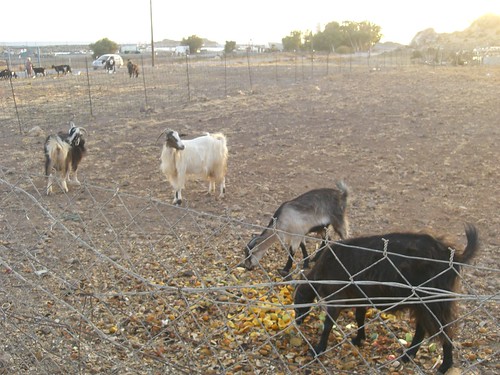
Goats will eat anything. They are good climbers, so they can climb up trees and eat the leaves on the top of the trees, once they have eaten the lower-lying leaves and scratched off the bark off the tree trunk. These goats are eating oranges which have been cut into chunks. There is nothing else visible on this field for the goats to eat, which probably hints at the fact that the farmer who owns them has brought them here for a short period of time.
The photo was taken at the end of summer, just over a year ago in Paleohora located on the south coast of Hania.
Saturday 11 October 2008
Rush grass chair seats
Traditional wooden woven chairs are not as popular as they once were, but these chairs are visibly old and much loved, as they are awaiting a new woven seat. The craftsman who weaves them (I decided to give him the right to his privacy) is not new to the town; I remember the first time I saw him crafting chair seats, in the village of Therisso, 15 years ago. He is probably the only person in Hania who is in this line of work, as I have never encountered anyone else weaving chairs, and I have seen him many times since my first encounter.
He works silently, hardly ever bothering to look up, completely oblivious to the passersby who stop to watch him; who wouldn't stop and watch him - deftly weaving grasses in and out of a frame, as though it is second nature to him, even though he knows the onlookers are there, staring at him as if he is a performing monkey.
This photo was taken outside an apartment building, across the road from the municipal park, with four traditional Cretan wooden chairs (not all are visible) waiting for his expert hands to be rewoven. The owner must love traditional customs; few people in town would place such furniture in their homes now, let alone restore them to their former glory.
Subscribe to:
Posts (Atom)
